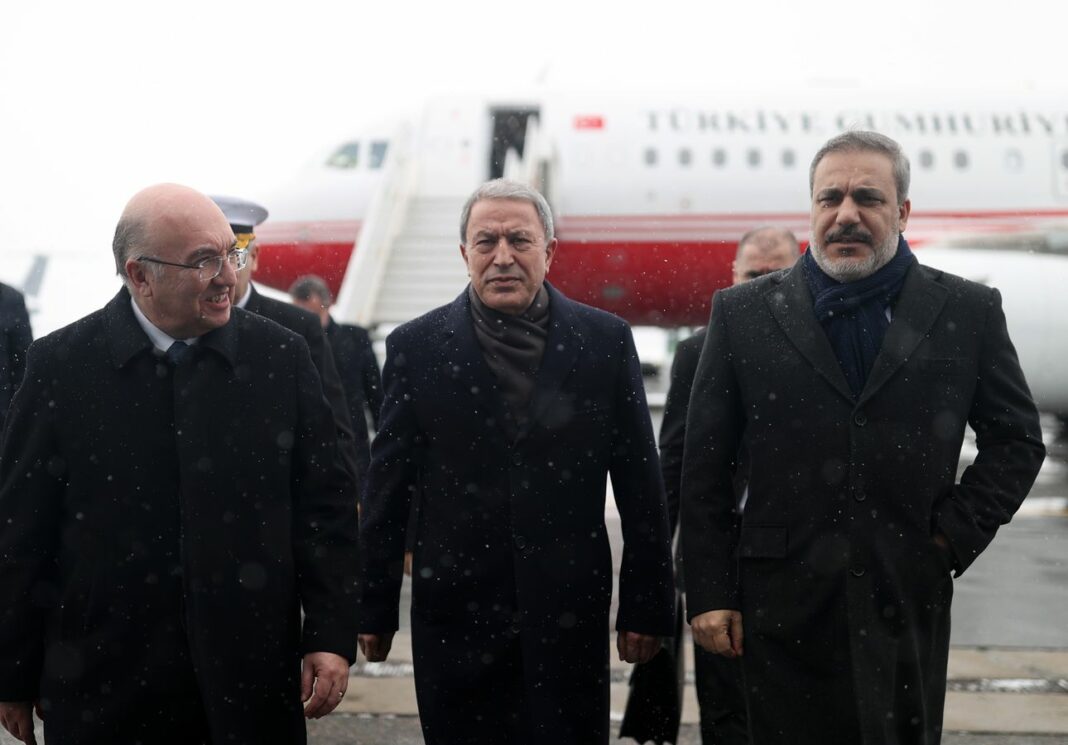« Move towards peaceful relations represents cause for alarm for more than 4m refugees in Turkey since 2011 » reports Ruth Michaelson in The Guardian.
Top Turkish and Syrian defence and security officials have held their first public meeting in more than a decade, in a dramatic shift towards normalising relations between the two countries after Ankara backed rebels during Syria’s civil war.
The Turkish defence minister, Hulusi Akar, and the head of the country’s national intelligence organisation (MIT), Hakan Fidan, met the Syrian defence minister, Ali Mahmoud Abbas, and the notorious spy chief Ali Mamlouk in Moscow, in a meeting attended by the Russian defence minister, Sergei Shoigu.
The Turkish defence ministry outlined how the group discussed “the Syrian crisis, the refugee problem”, and coordination regarding efforts to “combat all terrorist organisations in Syria”. The meeting, it added, “was held in a constructive atmosphere”, ensuring that the same officials would meet again in future.
The Moscow meeting represents a marked shift in Turkish policy as Ankara has supported and trained some Syrian rebel groups. Turkish territory along its southern border with Syria provided vital lifelines for rebels during the early stages of the Syrian civil war, and formed an essential exit point for millions of civilians who fled violence.
The move towards peaceful relations between Ankara and Damascus represents cause for alarm for the more than 4 million Syrian refugees who have sought shelter in Turkey since 2011. Turkey has recently accelerated efforts to increase what the state calls “voluntary returns”, including official claims that 100,000 people have been repatriated this year to countries including Syria, part of an anti-immigration push ahead of an election expected in June next year or before.
Human Rights Watch, however, documented how Turkish authorities arrested hundreds in their homes, workplaces or on the street, before detaining them and forcing them to sign voluntary return forms and then forcing them to cross back into Syria at gunpoint.
In 2017, the Turkish president, Recep Tayyip Erdoğan, told a press conference that “[Bashar al-Assad] is definitely a terrorist who has carried out state terrorism”, pointing to the thousands of civilians killed as well as 5.6 million refugees who have fled. Yet last September, Erdoğan suddenly signalled the beginnings of a change in policy when he declared that “diplomacy can never be cut off” with Damascus.
Two months later, he added that he was willing to hold a meeting with the Syrian leader. “A meeting with Assad can take place. There is no resentment in politics. Sooner or later, we can take steps,” he said.
Erdoğan’s comments about the need for diplomacy were echoed by foreign minister, Mevlüt Çavuşoğlu, who sparked protests among opponents of Assad in northern Syria after stating earlier this year that peaceful reconciliation between rebels and the Assad government was now a necessity.
The Guardian, December 29, 2023, Ruth Michaelson, Photo/Arif Akdogan/AA

